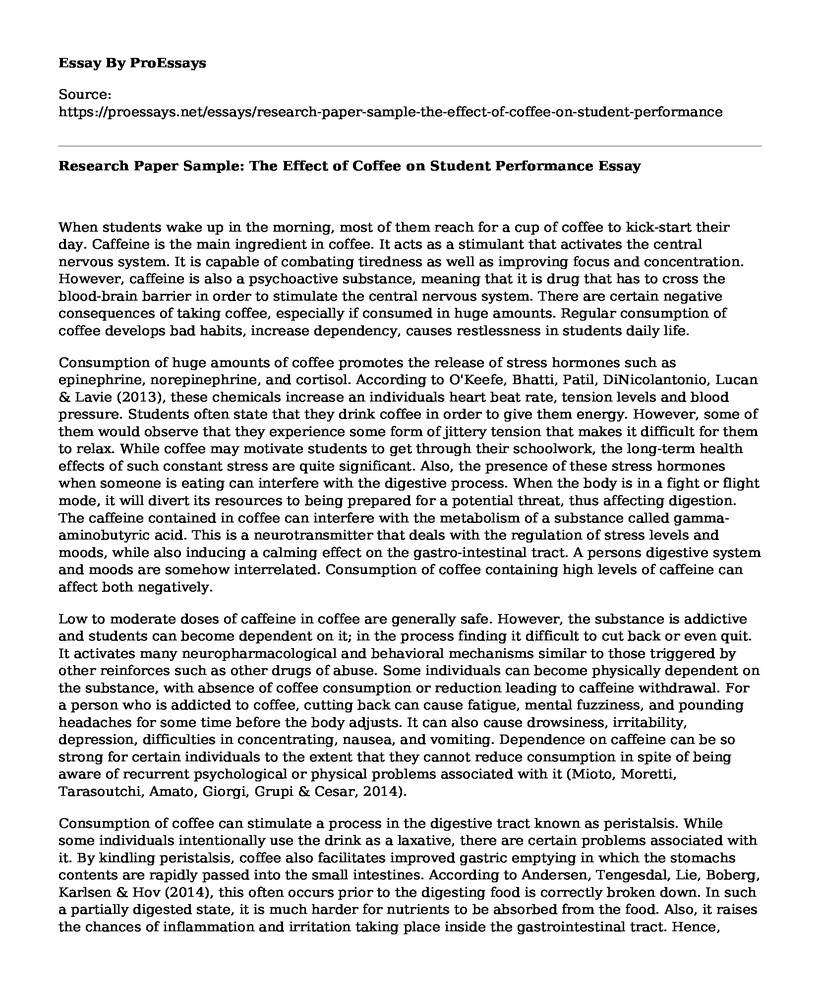When students wake up in the morning, most of them reach for a cup of coffee to kick-start their day. Caffeine is the main ingredient in coffee. It acts as a stimulant that activates the central nervous system. It is capable of combating tiredness as well as improving focus and concentration. However, caffeine is also a psychoactive substance, meaning that it is drug that has to cross the blood-brain barrier in order to stimulate the central nervous system. There are certain negative consequences of taking coffee, especially if consumed in huge amounts. Regular consumption of coffee develops bad habits, increase dependency, causes restlessness in students daily life.
Consumption of huge amounts of coffee promotes the release of stress hormones such as epinephrine, norepinephrine, and cortisol. According to O'Keefe, Bhatti, Patil, DiNicolantonio, Lucan & Lavie (2013), these chemicals increase an individuals heart beat rate, tension levels and blood pressure. Students often state that they drink coffee in order to give them energy. However, some of them would observe that they experience some form of jittery tension that makes it difficult for them to relax. While coffee may motivate students to get through their schoolwork, the long-term health effects of such constant stress are quite significant. Also, the presence of these stress hormones when someone is eating can interfere with the digestive process. When the body is in a fight or flight mode, it will divert its resources to being prepared for a potential threat, thus affecting digestion. The caffeine contained in coffee can interfere with the metabolism of a substance called gamma-aminobutyric acid. This is a neurotransmitter that deals with the regulation of stress levels and moods, while also inducing a calming effect on the gastro-intestinal tract. A persons digestive system and moods are somehow interrelated. Consumption of coffee containing high levels of caffeine can affect both negatively.
Low to moderate doses of caffeine in coffee are generally safe. However, the substance is addictive and students can become dependent on it; in the process finding it difficult to cut back or even quit. It activates many neuropharmacological and behavioral mechanisms similar to those triggered by other reinforces such as other drugs of abuse. Some individuals can become physically dependent on the substance, with absence of coffee consumption or reduction leading to caffeine withdrawal. For a person who is addicted to coffee, cutting back can cause fatigue, mental fuzziness, and pounding headaches for some time before the body adjusts. It can also cause drowsiness, irritability, depression, difficulties in concentrating, nausea, and vomiting. Dependence on caffeine can be so strong for certain individuals to the extent that they cannot reduce consumption in spite of being aware of recurrent psychological or physical problems associated with it (Mioto, Moretti, Tarasoutchi, Amato, Giorgi, Grupi & Cesar, 2014).
Consumption of coffee can stimulate a process in the digestive tract known as peristalsis. While some individuals intentionally use the drink as a laxative, there are certain problems associated with it. By kindling peristalsis, coffee also facilitates improved gastric emptying in which the stomachs contents are rapidly passed into the small intestines. According to Andersen, Tengesdal, Lie, Boberg, Karlsen & Hov (2014), this often occurs prior to the digesting food is correctly broken down. In such a partially digested state, it is much harder for nutrients to be absorbed from the food. Also, it raises the chances of inflammation and irritation taking place inside the gastrointestinal tract. Hence, consumption of coffee can affect bowel movement in the user.
References
Andersen, I. M., Tengesdal, G., Lie, B. A., Boberg, K. M., Karlsen, T. H., & Hov, J. R. (2014). Effects of coffee consumption, smoking, and hormones on risk for primary sclerosing cholangitis. Clinical Gastroenterology and Hepatology, 12(6), 1019-1028.
Mioto, B. M., Moretti, M. A., Tarasoutchi, D., Amato, R. V., Giorgi, D. M., Grupi, C. J., & Cesar, L. A. M. (2014). Effects of Coffee Consumption on Exercise Tolerance, Blood Pressure, Heart Rate, Heart Rate Variability and Premature Beats in Volunteers with Coronary Artery Disease. Circulation, 130(Suppl 2), A15209-A15209.
O'Keefe, J. H., Bhatti, S. K., Patil, H. R., DiNicolantonio, J. J., Lucan, S. C., & Lavie, C. J. (2013). Effects of habitual coffee consumption on cardiometabolic disease, cardiovascular health, and all-cause mortality. Journal of the American College of Cardiology, 62(12), 1043-1051.
Cite this page
Research Paper Sample: The Effect of Coffee on Student Performance. (2021, Jun 23). Retrieved from https://proessays.net/essays/research-paper-sample-the-effect-of-coffee-on-student-performance
If you are the original author of this essay and no longer wish to have it published on the ProEssays website, please click below to request its removal:
- Private vs. Public Schools Essay Example
- Essay Sample on Greek Health Beliefs
- Malpractice in Nursing Essay Example
- Essay Example on Bhopal Tragedy: 17,000 Dead, 120,000 Injured
- Covid-19 Crisis: Christians Call to Unite in Trust of Holy Spirit - Essay Sample
- Essay Example on Nursing Professionalism: An Inter-Professional and Intra-Professional Career
- Essay Sample on Ethics and Morality: Crucial Aspects of Individuals in Society







